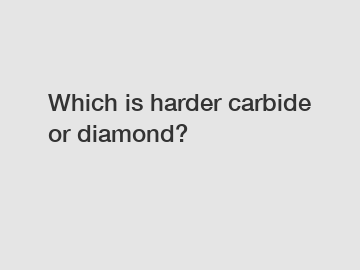Which is harder carbide or diamond?
Which is Harder, Carbide or Diamond?
Carbide and diamond are two extremely hard materials widely used in various industries. Determining which one is harder, carbide or diamond, is an intriguing question that sparks curiosity among many. In this article, we will explore the properties of carbide and diamond, compare their hardness, and delve into their uses and applications. So, which is harder, carbide or diamond? Let’s find out!
Point 1: Understanding Carbide.

Carbide refers to a composite material composed of carbon atoms bonded to metal atoms. Tungsten carbide is one of the most common forms of carbide and is known for its exceptional hardness. Carbide is formed through a process called sintering, which involves heating powdered metal and carbon at high temperatures. The result is a dense and rigid material that exhibits excellent wear resistance and strength.
Point 2: The Brilliance of Diamond.
Diamond, on the other hand, is a mineral made up of carbon atoms arranged in a unique crystal lattice structure. Its formation occurs under immense pressure and heat deep within the Earth's mantle. Diamonds are renowned for their exceptional hardness, unmatched by any other material. They possess the highest ranking on the Mohs scale, which measures the relative hardness of minerals.
Point 3: Comparing Hardness.
Now let's address the primary question: which is harder, carbide or diamond? While carbide is undeniably hard, diamond takes the crown when it comes to hardness. Diamond has a Mohs hardness of 10, making it the hardest natural material known to man. Carbide, on the other hand, typically has a hardness ranging from 8.5 to 9 on the Mohs scale. This means that diamond is significantly harder than carbide, making it an ideal material for cutting, grinding, and drilling applications.
Point 4: Applications of Carbide and Diamond.
Despite diamond's superiority in terms of hardness, carbide still finds broad applications due to its unique properties. Carbide is commonly used in cutting tools, such as drill bits, saw blades, and end mills, where its hardness allows for high-speed operations and longevity. Additionally, carbide is used in the manufacturing industry for machining processes. Diamond, on the other hand, finds its applications in various industries such as mining, gemstone cutting, electronics, and even in surgical tools due to its exceptional hardness and thermal conductivity.
Point 5: Factors Affecting Hardness.
Several factors contribute to the hardness of a material. Carbon atoms in diamond are tightly bonded in a three-dimensional structure, resulting in exceptional hardness. Carbide, on the other hand, consists of metal atoms bound to carbon atoms, providing hardness but not at the same level as diamond. The arrangement and strength of chemical bonds between atoms play a crucial role in determining the overall hardness of a material.
Conclusion:
In conclusion, diamond is indisputably the harder material when compared to carbide. Its unique crystal lattice structure and strong chemical bonds provide an exceptional level of hardness. However, carbide still holds its ground as a highly valuable material due to its excellent wear resistance and strength. Both materials play vital roles in different industries and have their specific applications. Whether you require the cutting precision of a diamond or the durability and cost-effectiveness of carbide, each material has its own purpose and benefits. Ultimately, the choice between carbide and diamond depends on the specific requirements of the task at hand.
For more information, please visit Carbide Rod Blank Supplier, carbide button bit, Carbide snow plow inserts.
211
0
0

Comments
All Comments (0)